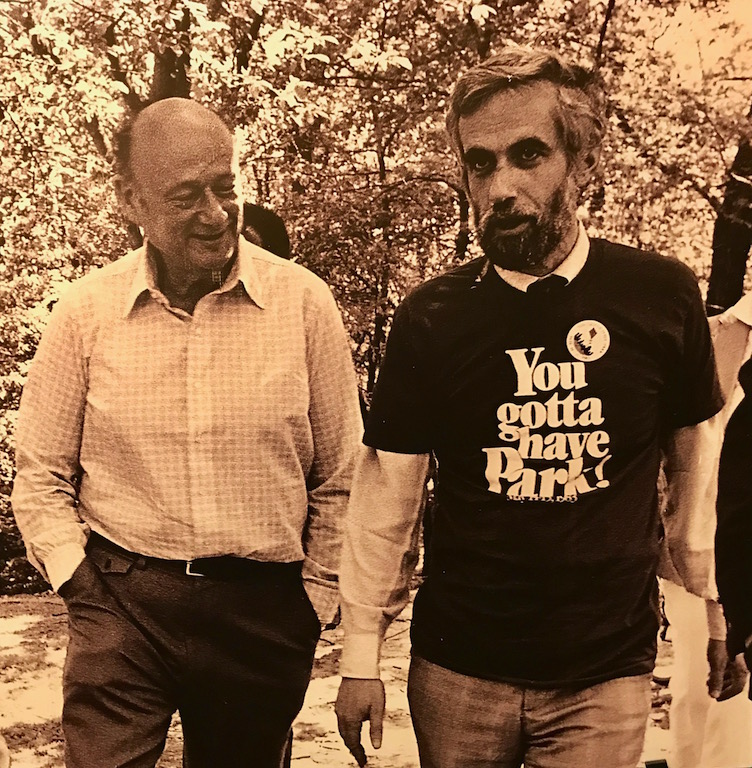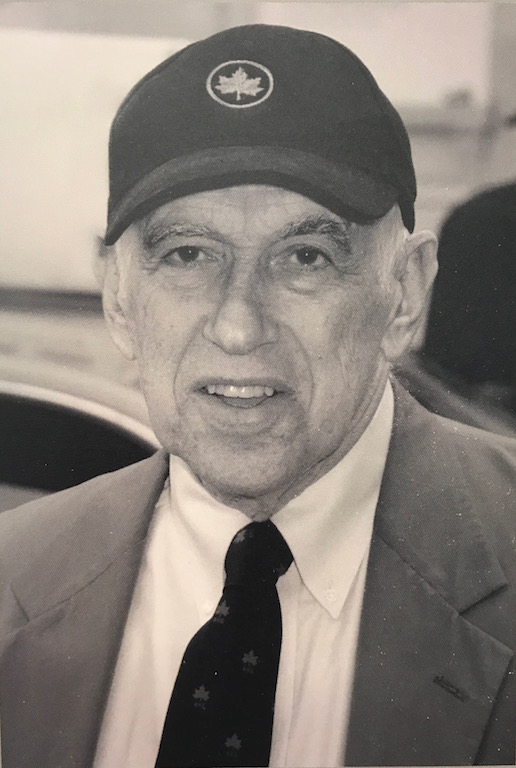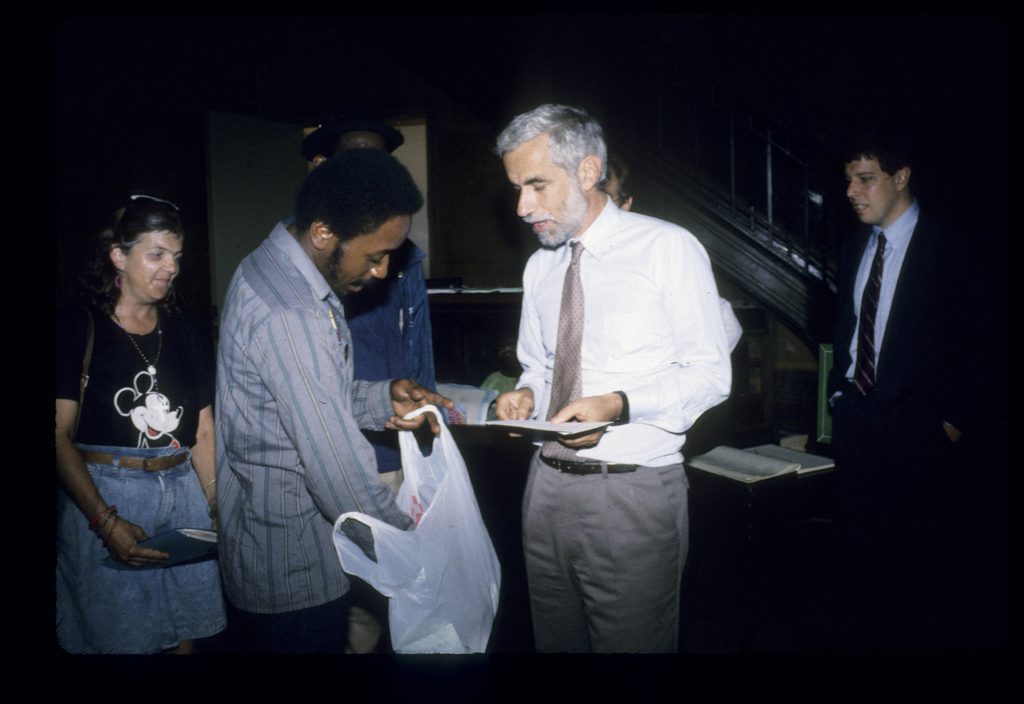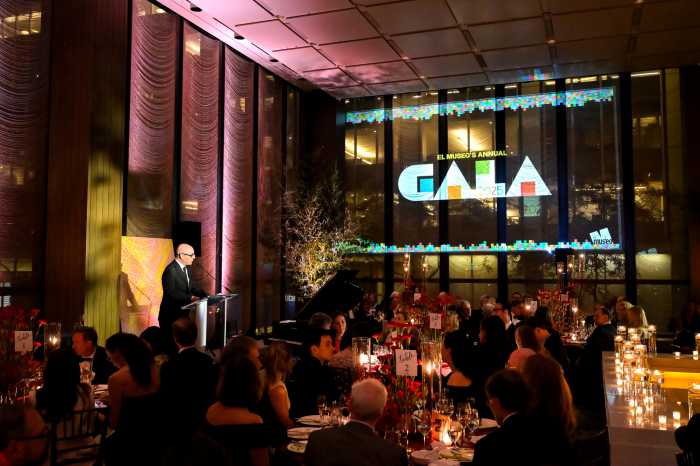BY GABE HERMAN | Former Parks Commissioner Henry Stern, who was passionate about green spaces and grew the city’s parklands by 1,600 acres, died on March 28. He was 83 and reportedly died of complications from Parkinson’s disease.
Stern lived on the Upper East Side but had a long connection to Greenwich Village, according to Jonathan Kuhn, director of art and antiquities for the Parks Department. As assistant to Borough President Constance Motley in the early 1960s, Stern was a liaison to Community Board 2.
Stern was also a councilmember at large in the 1970s. During his early political years he worked often with Tony Dapolito, a longtime leader of C.B. 2 and its Parks Committee.

Stern was also close to former Mayor Ed Koch, and would sometimes go to the Film Forum with him to watch movies, according to Kuhn.
“He had a great affection for the Village,” Kuhn said.
When asked about Stern’s personality, Kuhn said he could be very demanding, and was interested in history and streetscapes.
“He was a passionate advocate for open space,” Kuhn said.
Stern served as the city’s Parks commissioner from 1983 to 1990 under Koch and from 1994 to 2002 under former Mayor Rudy Giuliani.
Kuhn said that in the mid-’90s, Stern set up the Partnerships for Parks, which cultivated friends groups for parks. The effects in the Village alone can be seen in friends groups for such parks as Abingdon Square, Jackson Square and Christopher Park.
Kuhn said that Stern, along with former Parks Commissioner Gordon Davis, both inherited the parks under hard times. He said both Stern and Davis improved the city’s green spaces through a philosophy that included, “have the public feel some ownership over their parks and some deeper connection, rather than it being something remote and government will just take care of. A partnership between citizens and government. A pretty brilliant idea,” Kuhn said.
Stern issued the historical-signs project, so every park would have signs for people to identify them. The signs would give background about who a particular park was named after and that person’s accomplishments.
Stern created more than 1,000 of the signs and often wrote them himself. Village parks were given names like Father Demo Square and Golden Swan Garden, the latter for a former cafe at the W. Fourth St. and Sixth Ave. site.
Stern wanted to honor Dapolito by naming the Thompson St. Playground after him, but there was a rule that parks could not be named for living people. So it was called Vesuvio Playground for the bakery the C.B. icon ran. After Dapolito’s death, the Carmine St. Recreation Center — a Parks Department facility — was named for him.
“He was serious when he was working, and eccentric in other ways,” recalled Carol Greitzer, a former longtime councilmember who worked with Stern when he was a councilmember at large.
Greitzer said that once when Stern was Parks commissioner, someone went to see him at his office at The Arsenal in Central Park for an interview, and Stern was sitting there with a live duck. No one knew where the duck came from or how it got in.

Greitzer recalled another time when Stern was at her Village apartment for a gathering and he just lied down on the floor and took a nap, while people were talking.
Stern had a dog, Boomer, and in another quirk, he would tally the number of times people pet him.
Stern’s humor could sometimes be seen as politically incorrect. In later years in his post, he was accused of discrimination against black and Hispanic employees in a federal class-action lawsuit. He denied the accusations. The city settled the case in 2008 for $20 million.
Greitzer said that Stern often hung out at the Village Independent Democrats club, which endorsed him and Bobby Wagner for the two councilmember at large seats. Stern was a Liberal while Wagner was a Democrat.
“There were many sides to Henry. He was very smart and had a good memory,” Greitzer said. She recalled him talking to her about becoming a father, about its obligations and if he could do a good job.
Stern married Dr. Margaret Ewing in 1976. He is survived by her and two sons, Jared and Kenan, along with a sister Susanne, brother Kenneth and five grandchildren.
Stern was born on May 1, 1935. He grew up in Inwood, in northern Manhattan. His father sold tents and his mother was a bookkeeper. He graduated from Bronx High School of Science at age 15 and earned a Harvard Law degree at 22.
At a memorial service at Park East Synagogue on the Upper East Side on March 31, family and longtime colleagues spoke of Stern’s decades in public service and shared quirky stories about his personality.
“His greatest legacy is the people he brought together,” said son Jared, “and who shared his passion for public service, including for public parks.”
Jared noted his father’s famous penchant for giving out “park names” to people, handing out more than 6,000 nicknames over all. His own park name was Starquest, “Star” from Stern and “Quest” for his love of questioning things.
“My dad was not a conventional father,” said Kenneth, to laughs in the packed sanctuary. He said his father had a dry humor and wit, and wouldn’t take anything at face value.
“Henry made the parks a place of joy,” said former Mayor Giuliani at the service. “You can’t think of Henry without smiling and laughing.”

Giuliani noted that Stern was able to institutionalize his legacy over two terms as Parks commissioner.
“I was proud to be his friend,” Giuliani said, “but I was prouder he did something very special for the city I love.”
Ian R. Shapiro, a former assistant to Stern, noted that Stern introduced using animal art in every playground, such as sprinklers shaped like different creatures. And he wanted every traffic triangle to be turned into a green space, known as “greenstreets.”
Stern famously held tree funerals when ones were cut down or destroyed. Shapiro recalled that after one such event, Stern was walking away when a reporter asked what the message of the tree funeral was.
“Don’t f— with our trees,” Stern replied.
Other officials at the memorial service included Manhattan Borough President Gale Brewer, former Borough President Ruth Messinger, Gordon Davis and current Parks Commissioner Mitchell Silver.
In a statement to this paper, Silver said of Henry, “he was unique, memorable, and most of all, a dedicated public servant. We are grateful for his passion for all things parks; his work brought our city’s green spaces back into the forefront of public consciousness. His legacy will live on eternally.”
Adrian Benepe, Parks commissioner from 2002-12, said at the service that Stern was “an unabashed tree hugger,” who fought for “arborcide” laws and had a guide published about the city’s trees.
He noted that Stern initiated the creation of the City Parks Foundation and other nonprofits that spend $180 million annually for parks.
Benepe said that Stern was trying to create a community of park devotees in handing out so many nicknames. And he said that Stern could be quirky, demanding, worked long hours, and always had time to listen to people, especially those without any type of lofty status.
Rabbi Arthur Schneier said at the memorial that Stern remained humble even with all his accomplishments, and he didn’t have ego or pride. And the rabbi said he had never been to a memorial service that shared so much laughter, and history of New York City.
In a phone interview, former East Village activist John Penley recalled Stern’s interactions with the residents of Tent City in the late 1980s, when homeless people occupied Tompkins Square Park in large numbers in a sprawling sort of shantytown.
“I was sad to hear about it,” Penley said of the news of Stern’s passing. “I actually liked the guy. He pretty much let Tent City go down there for a number of years under Koch. He was friendly, humane in the way he handled it. It was Dinkins who evicted Tent City, not Koch,” he noted, referring to former Mayor David Dinkins, under whom Stern was not Parks commissioner.
With reporting by Lincoln Anderson


































